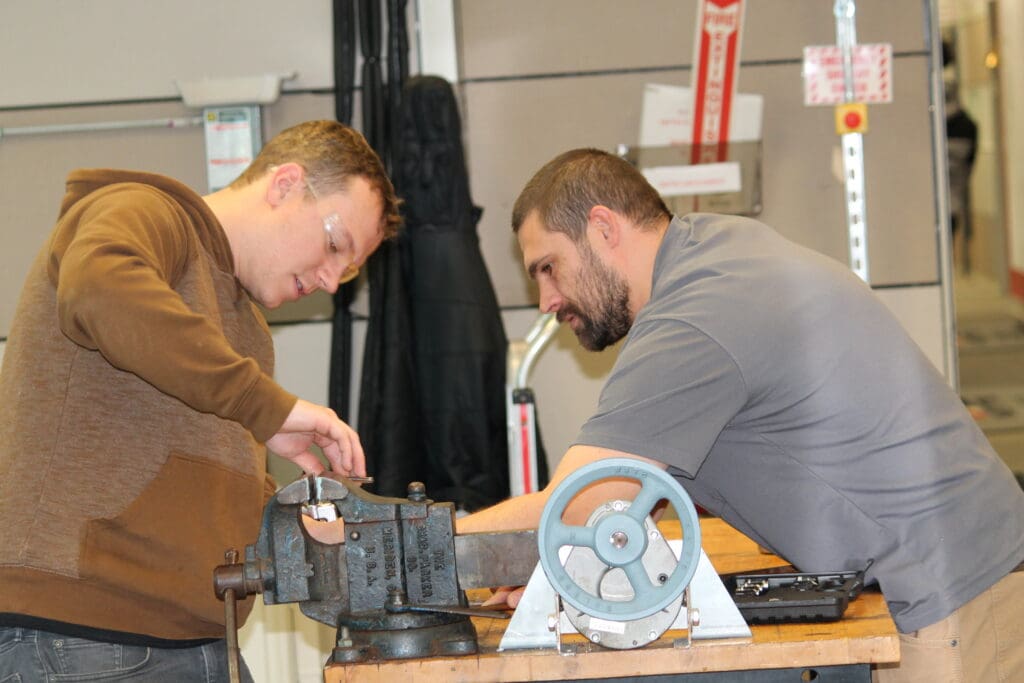
When some people think about what to do after high school, the first thing that often comes to mind is attending college. But in recent years, increasing numbers of young adults are rethinking that path and many are turning toward trade schools instead. A 2025 quarterly report from Validated Insights predicts enrollments in trade schools and trade programs will increase more than 6.5% annually. Both options can lead to successful, stable careers, but they can offer very different experiences, costs, and outcomes.
If you’ve ever wondered how trade school compares to college and why students choose a trade school or college, this post helps to break it down.
What Is a Trade School?
Trade schools, sometimes called career or technical schools, focus on providing hands-on training for specific jobs. Instead of taking general education courses like History or English, students in trade schools spend most of their time learning and developing the practical skills they’ll be using on the job path they are training for.
Programs can range from truck driving and HVAC to electrical, welding, or healthcare training. These programs typically require less time than a traditional college bachelor’s degree, often lasting a few months to two years, and they’re designed to get students into the workforce.
Schools like New England Tractor Trailer Training School (NETTTS) train students for future careers such as Commercial Truck Driving and HVACR (Heating, Ventilation, Air Conditioning, and Refrigeration). These are jobs that help keep communities running, and require specially trained skilled workers.
What Is a College?
College, on the other hand, generally refers to a two- or four-year academic program that leads to an associate or bachelor’s degree. Students take a mix of general education and major-specific courses. For example, someone studying business will likely take classes in math, communication, marketing, and economics alongside electives in other subjects such as language arts.
A college degree can open doors to a variety of opportunities, some of which require higher education as a baseline, such as engineering, teaching, or nursing. However, some college programs come with higher costs and a longer time commitment than a trade school.
Key Differences Between Trade School and College
While both trade schools and colleges help people advance their education and careers, they do so in different ways. Here are some of the main differences:
1. Program Length
Trade School: Most programs last between 6 months and 2 years, and are geared towards students entering the workforce after graduation.
College: Associate degrees take about 2 years, while bachelor’s degrees typically take 4 years.
2. Cost
Trade school programs generally cost much less than a four-year degree but will depend on the school and field of study. Data from the National Center for Education Statistics (NCES) and other research confirms the significant price gap between shorter term credentials and a bachelor’s degree.

3. Learning Style
Trade School: Often focuses on hands-on, practical training. Students will often have the opportunity to spend time in workshops, labs, or behind the wheel throughout their education.
College: Primarily academic and theory-based, with more time spent in classrooms and on written assignments or research.
4. Career Paths
Trade School: Typically provides entry-level training that can lead directly to certification or licensure in specific jobs like CDL driver, HVACR technician, electrician, or welder to begin upon graduation.
College: Can lead to broader career options. Graduates often find internships or additional experiences to explore career options.
Similarities Between Trade School and College

Although the two paths look different, trade schools and colleges do share some similarities:
- Accreditation and Standards: Both types of schools can be accredited, which means they meet certain educational standards.
- Financial Aid: Many trade schools and colleges are able to offer financial aid options for qualifying students.
- Career Advancement: Both paths help people build careers and improve their earning potential.
- Commitment to Learning: Whether you’re studying HVAC systems or business management, both require dedication and effort to succeed.
Why Young Adults Are Choosing Skilled Trades
In recent years, trade schools have seen growing interest especially among young adults and those who want to make a career change. Here are a few reasons why skilled trades are becoming an increasingly popular choice:
1. Workforce Entry
Trade school programs are often shorter, meaning students can finish training and start getting to work faster. For adults balancing family responsibilities, work, and paying bills, that can be a big deal.
Instead of spending four years in school, trade students can complete their job training program in a certificate or diploma program in a year or less, gaining experience and building a career path forward.
2. Strong Job Prospects
From transportation to HVAC, skilled trades are essential services to everyday life. Trucks move nearly everything we buy, and trained HVAC technicians keep homes and businesses comfortable year-round.
With fewer young people entering these fields than in the past, employers are eager to hire and often offer competitive pay and benefits.
3. Hands-On Work
Many adults prefer work that’s active and practical rather than one that requires being in an office at a desk. Skilled trades offer the chance to work out in the community with your hands, solving real problems, and seeing the results of your efforts every day.
4. Outsourced Work
Unlike some industries that rely heavily on technology or remote work, skilled trades can’t be outsourced overseas or fully automated. People are needed who can build, repair, drive, and maintain critical systems.

Making the Right Choice for You
There’s no “one-size-fits-all” answer when it comes to choosing between trade school and attending a traditional college. The right path depends on your personal goals, interests, and lifestyle.
If you enjoy hands-on work, want to start your chosen career sooner, and prefer a more practical education, trade school could be a great fit. If you’re interested in academic studies or a career that requires a degree, college might be the better choice.
The good news is that both paths can lead to stable, rewarding futures. It’s all about finding the one that fits you best.
Making the Choice
Choosing between trade school and college is one of the biggest decisions you can make but it doesn’t have to be overwhelming.
Trade schools like NETTTS give adults the opportunity to build real-world skills, start new careers, and take control of their future in less time. Whether you’re considering becoming a tractor trailer driver, HVAC technician, or exploring another skilled trade, now can be your time to get started.
The world needs people who can keep things moving, running, and working and that’s what trade schools help train you to do.




